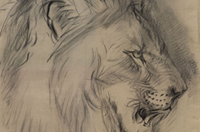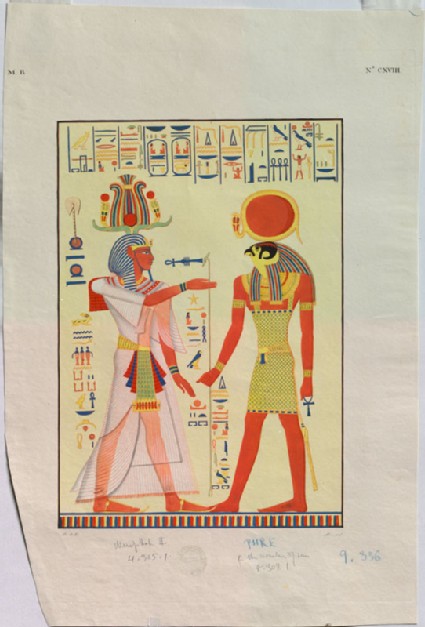Ruskin's Standard & Reference series (1872)
Exemplary works of art. In the catalogue of the Reference series, items marked 'M' are drawings "by my own Hand" (by Ruskin), P are photographs, E engravings and A by Ruskin's Assistant, Arthur Burgess.

Ruskin's Catalogues: 1 object
Show search help- Reference URL
Actions
Engraving of a Painting of Merneptah adoring Re-Harakhti, from Merneptah's Tomb at Biban el-Moluk Duchesne
-
Ruskin text
179. Menepthah II. adoring Phre. Rosellini, Tavole, tom. i. pl. 118. Text, tom. iv. p. 305. -
Curator’s description:
Description
The engraving shows two figures: on the left, a pharaoh, Merneptah; on the right, the falcon-headed deity Re-Harakhti. It reproduces the painting to the left of the entrance to Merneptah's tomb in Biban el-Moluk (the Valley of the Kings) (Porter & Moss, "Topographical Bibliography", 2nd ed, Oxford (Clarendon Press & Griffith Institute): 1960-1999, vol. I, pt 2, p. 507).
The print is taken from the first volume of plates from Ippolito Rosellini's "Monumenti dell' Egitto e della Nubia", published in 1832. It was first catalogued by Ruskin in the "Catalogue of Examples" of 1870, as no. 104 in the Standard Series; in the 1872 catalogue of the Standard and Reference Series, it was renumbered as no. 179 in the Reference Series. It was placed alongside other plates from Rosellini.
The engraver, named as 'M', cannot be identified with certainty.
In a note in "The Ethics of the Dust", explaining how the individual aspects of the Egyptian deities were still largely unknown, Ruskin was somewhat sceptical of Rosellini's qualities: 'for the full titles and utterances of the gods, Rosellini is as yet the only - and I believe, still a very questionable - authority' (Ethics of the Dust, note III = XVIII.363). In his entry below nos 176-180 in the Reference Series, Ruskin again questioned Rosellini's accuracy, noting that the colours were sometimes conjectural, 'slight traces of the original pigments, and those changed by time, being interpreted often too arbitrarily' (Standard and Reference Series catalogue, p. 22).
In the section of "Aratra Pentelici" which expanded upon his lecture on "Imagination" of 26 November 1870, Ruskin was more interested in the relationship between sculpture and polychromy, noting that 'all the early sculpture of the most accomplished nations has been thus coloured' and that, as soon as colour was applied within a scratched outline, 'the colouring soon becomes a principal means of effect, so that, in the engraving of an Egyptian-colour bas-relief (S. 101 [now Reference Series no. 176]), Rosellini has been content to miss the outlining incisions altogether, and represent it as a painting only' (Aratra Pentelici, § 32 = XX.222)
-
Details
- Artist/maker
-
Alessandro Ricci (active 1828 - 1829)Anonymous Italian (Anonymous, Italian) (engraver)
- Object type
- Material and technique
- watercolour and bodycolour over etching and engraving in red and black ink on wove paper
- Dimensions
- 427 x 299 mm (plate); 644 x 432 mm (sheet)
- Associated place
-
- Africa › Egypt › Qinā › Biban el-Moluk › Tomb of Merneptah › Tomb of Merneptah (subject)
- Inscription
- Recto, engraved:
top left: M.R.
top right: No. CXVIII
bottom left: R. da D.
bottom right: M. scul.
Recto, manuscript:
bottom, left of centre, in graphite: Menepthah II | 4.305.I
bottom, right of centre, in blue pencil: PHRE
just below, in graphite: of [?] the mountain of sun | 4.308.1
bottom right, in blue pencil: 9. 356
Verso, bottom centre, the Ruskin School's stamp
On a separate card label, in graphite: Sland [sic = Stand] arc [?] _104_ Menepthah 2nd. adoring Phre
- Provenance
-
Presented by John Ruskin to the Ruskin Drawing School (University of Oxford), 1875; transferred from the Ruskin Drawing School to the Ashmolean Museum, c.1949.
- No. of items
- 1
- Accession no.
- WA.RS.REF.179
-
Subject terms allocated by curators:
Subjects
-
References in which this object is cited include:
References
Ruskin, John, Catalogue of Examples Arranged for Elementary Study in the University Galleries (Oxford: Clarendon Press, 1870), cat. Standard no. 104
Rosellini, Ippolito, I monumenti dell' Egitto e della Nubia: Disegnati dalla spedizione scientifico-letteraria toscana in Egitto: distributi in ordine di materie, 12 (Pisa: Presso N. Capurro, 1832-1844), pt I, Tavole, pl. CXVIII
Ruskin, John, Catalogue of the Reference Series Including Temporarily the First Section of the Standard Series (London: Smith, Elder, [1872]), cat. Reference no. 179
Ruskin, John, ‘The Ruskin Art Collection at Oxford: Catalogues, Notes and Instructions’, Edward T. Cook and Alexander Wedderburn, eds, The Works of John Ruskin: Library Edition, 39 (London: George Allen, 1903-1912), 21, cat. Reference no. 179
Location
-
- Western Art Print Room
Position in Ruskin’s Collection
Ruskin's Catalogues
-
Ruskin's Catalogue of Examples (1870)
104. Menepthah II adoring Phre. Rosellini, Tavole, tom. i. pl. 118. Text, tom. iv. p. 305. -
Ruskin's Standard & Reference series (1872)
179. Menepthah II. adoring Phre. Rosellini, Tavole, tom. i. pl. 118. Text, tom. iv. p. 305.





